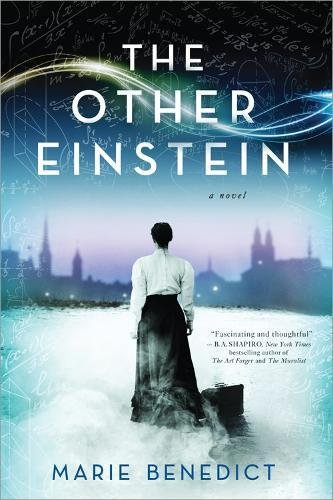
 Mileva and Albert are drawn to each other from the beginning of their years together at the Polytechnic. How is this disability both a blessing and a curse? How does her limp impact her differently at different life stages? From a very young age, Mileva assumes that she will never marry due to her physical disability. What life events led her to math and science? What hurdles did she have to surmount to even get her footing on that path? Over the course of the novel, we learn a great deal about Mileva’s childhood and early adult years. Does this historical setting affect the characters? What role, if any, does it play in shaping their lives? Discuss the setting of the book, a world on the brink of astounding scientific discoveries, political upheaval, and ultimately horrible World War I atrocities. What forms of betrayal does she experience? How does her reaction to those betrayals propel the story forward, for better or worse? Has Mileva engaged in betrayal herself? Betrayal is a recurrent motif in the book and an unfortunate reality in Mileva’s life. How does the study of math and physics become this quest for Albert and Mileva? Are they, either separately or together, successful in their crusade? Does unpuzzling life’s mysteries have disparate meanings for them? This novel can be seen as a quest for understanding, a search for the divine in the natural order of the world.
Mileva and Albert are drawn to each other from the beginning of their years together at the Polytechnic. How is this disability both a blessing and a curse? How does her limp impact her differently at different life stages? From a very young age, Mileva assumes that she will never marry due to her physical disability. What life events led her to math and science? What hurdles did she have to surmount to even get her footing on that path? Over the course of the novel, we learn a great deal about Mileva’s childhood and early adult years. Does this historical setting affect the characters? What role, if any, does it play in shaping their lives? Discuss the setting of the book, a world on the brink of astounding scientific discoveries, political upheaval, and ultimately horrible World War I atrocities. What forms of betrayal does she experience? How does her reaction to those betrayals propel the story forward, for better or worse? Has Mileva engaged in betrayal herself? Betrayal is a recurrent motif in the book and an unfortunate reality in Mileva’s life. How does the study of math and physics become this quest for Albert and Mileva? Are they, either separately or together, successful in their crusade? Does unpuzzling life’s mysteries have disparate meanings for them? This novel can be seen as a quest for understanding, a search for the divine in the natural order of the world. 

How do the characters in the book-Mileva, Albert, their friends, their parents-experience religion, and does that change over the course of the story? How do Mileva’s and Albert’s different understandings of religiosity impact their relationship to each other?.

Do you think gender would influence Mileva’s life in the same way if she lived today?
Discuss the various ways that gender affects the characters in this novel. Are you reading The Other Einstein along with us during the Big Library Read? Join us in a conversation below, or use these questions to discuss with your Book Club or those around you!








 0 kommentar(er)
0 kommentar(er)
